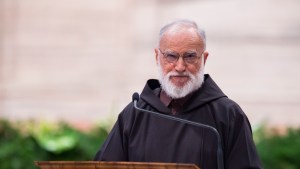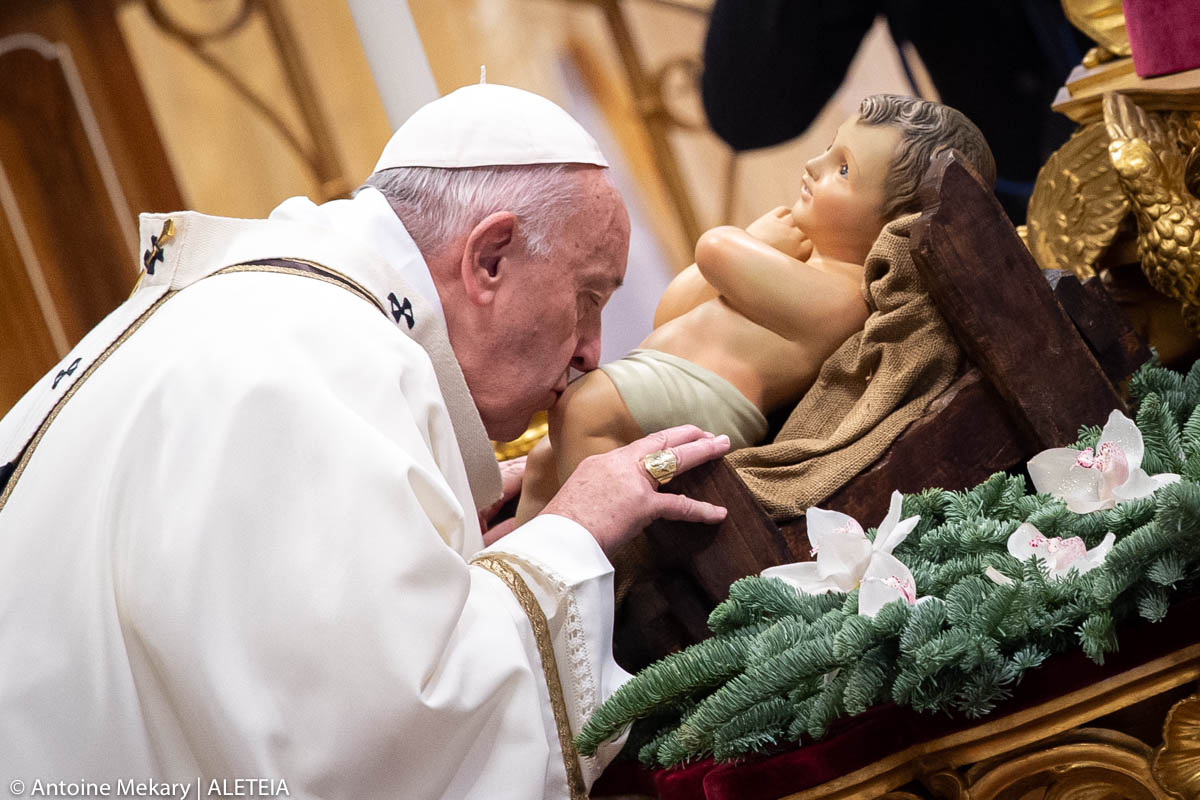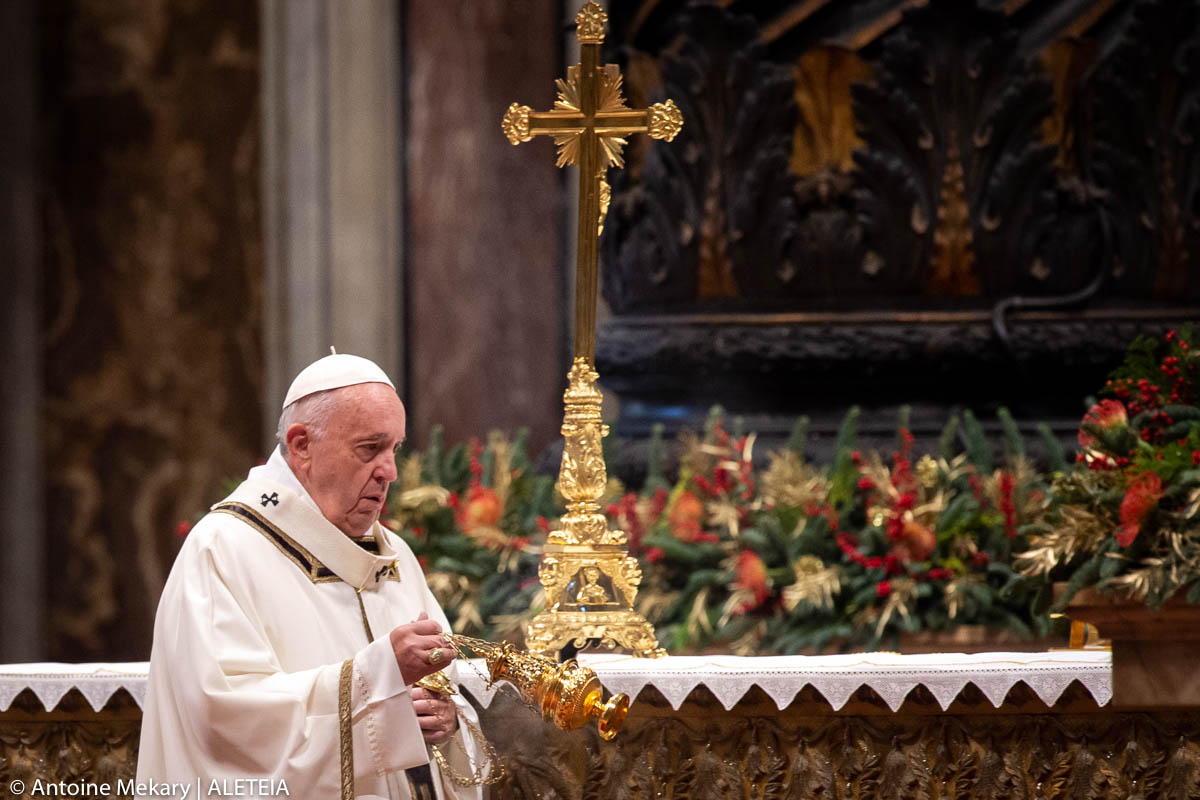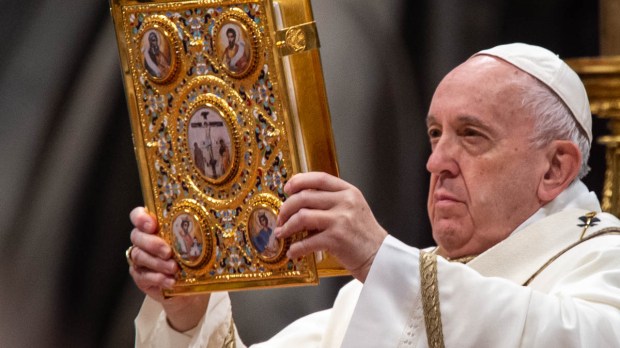In the Gospel (Mt 2:1-12), we heard the Magi begin by stating the reason why they have come: “We have seen his star in the East, and have come to worship him” (v. 2). Worship is the end and goal of their journey. Indeed, when they arrived in Bethlehem, “they saw the child with Mary his mother, and they fell down and worshiped him” (v. 11). Once we lose the sense of worship, we lose our direction in the Christian life, which is a journey towards the Lord, not towards ourselves. The Gospel warns us about this risk, for alongside the Magi it presents others who are incapable of worship.
First of all, there is King Herod, who uses the word worship, but only to deceive. He asks the Magi to tell him where the child is to be found, “so that I too may come and adore him” (v. 8). The fact is that Herod worshiped only himself; that is why he wanted to rid himself of the child through a lie. What does this teach us? That when we do not worship God, we end up worshiping ourselves.
So too, the Christian life, when it fails to worship the Lord, can become a discreet way of affirming ourselves and our own abilities: Christians who do not know how to worship, who do not know how to pray by worshiping. This is a grave risk: we use God instead of serving him. How many times have we confused the interests of the Gospel with our own? How many times have we cloaked in religiosity the things we find convenient? How many times have we confused God’s power, which is for serving others, with power of this world, which is for serving ourselves!

Read more:
Why worship is so good for us: Father Cantalamessa explains
In addition to Herod, other people in the Gospel are incapable of worship: they are the chief priests and the scribes. They tell Herod with great precision where the Messiah is to be born: in Bethlehem of Judea (cf. v. 5). They know the prophecies and can quote them exactly. They know where to go – they are great theologians, great! – but they do not go there.
Here too we can draw a lesson. In the Christian life, it is not enough to be knowledgeable: unless we step out of ourselves, unless we encounter others and worship, we cannot know God. Theology and pastoral effectiveness mean little or nothing unless we bend the knee; unless we kneel down like the Magi, who were not only knowledgeable about planning a journey, but also capable of setting out and bowing down in worship. Once we worship, we come to realize that faith is not simply a set of fine doctrines, but a relationship with a living Person whom we are called to love. It is in encountering Jesus face to face that we come to see him as he is.
Through worship, we discover that the Christian life is a love story with God, where what really matters is not our fine ideas but our ability to make him the centre of our lives, as lovers do with those whom they love. This is what the Church ought to be, a worshiper in love with Jesus her spouse.
As we begin the New Year, may we discover anew that faith demands worship. If we can fall on our knees before Jesus, we will overcome the temptation to set off on our own path. For worship involves making an exodus from the greatest form of bondage: slavery to oneself. Worship means putting the Lord at the centre, not ourselves. It means giving things their rightful place, and giving the first place to God. Worship means making God’s plan more important than our personal time, our entitlements and our spaces. It is to accept the teaching of Scripture: “You shall worship the Lord your God” (Mt 4:10). Your God: worship means realizing that you and God belong together, to one another. It means being able to speak to him freely and intimately. It means bringing our lives to him and letting him enter into them. It means letting his consolation come down to earth. Worship means discovering that, in order to pray, it is enough to say: “My Lord and my God!”, and to let ourselves be pervaded by his tender love.
Worship means going to Jesus without a list of petitions, but with one request alone: to abide with him. It is about discovering that joy and peace increase with praise and thanksgiving. In worship, we allow Jesus to heal and change us. In worship, we make it possible for the Lord to transform us by his love, to kindle light amid our darkness, to grant us strength in weakness and courage amid trials. Worship means concentrating on what is essential: ridding ourselves of useless things and addictions that anaesthetize the heart and confound the mind. In worship, we learn to reject what should not be worshiped: the god of money, the god of consumerism, the god of pleasure, the god of success, the god of self.
Worship means bending low before the Most High and to discover in his presence that life’s greatness does not consist in having, but in loving. Worship means recognizing that we are all brothers and sisters before the mystery of a love that bridges every distance: it is to encounter goodness at the source; it is to find in the God of closeness the courage to draw near to others. Worship means knowing how to be silent in the presence of the divine Word, and learning to use words that do not wound but console.
Worship is an act of love that changes our lives. It is to do what the Magi did. To bring gold to the Lord and to tell him that nothing is more precious than he is. To offer him incense and to tell him that only in union with him can our lives rise up to heaven. To present him with myrrh, balm for the bruised and wounded, and to promise him that we will aid our marginalized and suffering neighbours, in whom he himself is present.
We usually know how to pray – we ask the Lord, we thank him – but the Church must move forward in her prayer of worship; we must grow in worshiping. This is wisdom that we must learn each day. Praying by worshiping: the prayer of worship.
Dear brothers and sisters, today each one of us can ask: “Am I a Christian who worships?” Many Christians pray but they do not worship. Let us ask ourselves this question: Do we find time for worship in our daily schedules and do we make room for worship in our communities? It is up to us, as a Church, to put into practice the words we prayed in today’s Psalm: “All the peoples on earth will worship you, O Lord”. In worshiping, we too will discover, like the Magi, the meaning of our journey. And like the Magi, we too will experience “a great joy” (Mt2:10).



